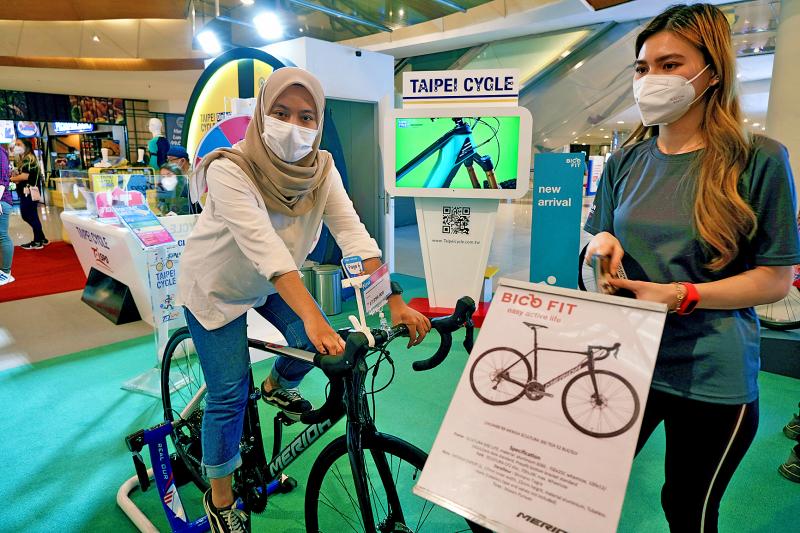Bicycle maker Merida Industry Co Ltd (美利達) last week reported annual declines in shipments and revenue for last month, as it continued to face shortages of components and shipping containers.
Consolidated revenue last month dropped 24.04 percent year-on-year to NT$1.82 billion (US$64.89 million), while 78,801 units were shipped, a decline of 25.47 percent, the company said in a statement on Friday.
“The supply of components is still very unstable,” Merida said.

Photo: CNA
In addition, “shipping space is limited and the container shortage remains. Thus far, we still have about 15,000 bikes waiting to be shipped,” it said.
The month had fewer working days and Merida is transitioning to a new enterprise resource planning (ERP) system, which also contributed to its reduced output and decline in sales, the company said.
Merida launched the new ERP system early last month, but the switching from the old system disrupted production, it said, adding that it expects production utilization to improve as the new ERP system is running more smoothly every day.
From January to last month, the company shipped 930,436 bicycles, up 12.49 percent from the same period of last year, while combined revenue over the nine-month period increased 12.87 percent year-on-year to NT$22.76 billion.
Merida’s revenue is expected to rise from NT$7.46 billion last quarter to NT$8.43 billion this quarter, as some shipments would be delayed from last quarter to this quarter, Yuanta Securities Investment Consulting Co (元大投顧) said in a note on Friday.
As end-market inventories in the US and Europe are less than one month amid sustained demand, and electric bike demand remains robust in those markets, Merida’s revenue for this year could reach NT$31.03 billion, up from NT$27.07 billion last year, Yuanta said.
Separately, Giant Manufacturing Co Ltd (巨大機械) on Friday reported that its revenue for last month rose 1.09 percent year-on-year to NT$6.52 billion as demand remained strong in the US and Europe.
That brought the company’s cumulative revenue in the first nine months to NT$61.9 billion — an annual increase of 17.83 percent.

DIVIDED VIEWS: Although the Fed agreed on holding rates steady, some officials see no rate cuts for this year, while 10 policymakers foresee two or more cuts There are a lot of unknowns about the outlook for the economy and interest rates, but US Federal Reserve Chair Jerome Powell signaled at least one thing seems certain: Higher prices are coming. Fed policymakers voted unanimously to hold interest rates steady at a range of 4.25 percent to 4.50 percent for a fourth straight meeting on Wednesday, as they await clarity on whether tariffs would leave a one-time or more lasting mark on inflation. Powell said it is still unclear how much of the bill would fall on the shoulders of consumers, but he expects to learn more about tariffs

NOT JUSTIFIED: The bank’s governor said there would only be a rate cut if inflation falls below 1.5% and economic conditions deteriorate, which have not been detected The central bank yesterday kept its key interest rates unchanged for a fifth consecutive quarter, aligning with market expectations, while slightly lowering its inflation outlook amid signs of cooling price pressures. The move came after the US Federal Reserve held rates steady overnight, despite pressure from US President Donald Trump to cut borrowing costs. Central bank board members unanimously voted to maintain the discount rate at 2 percent, the secured loan rate at 2.375 percent and the overnight lending rate at 4.25 percent. “We consider the policy decision appropriate, although it suggests tightening leaning after factoring in slackening inflation and stable GDP growth,”

Meta Platforms Inc offered US$100 million bonuses to OpenAI employees in an unsuccessful bid to poach the ChatGPT maker’s talent and strengthen its own generative artificial intelligence (AI) teams, OpenAI CEO Sam Altman has said. Facebook’s parent company — a competitor of OpenAI — also offered “giant” annual salaries exceeding US$100 million to OpenAI staffers, Altman said in an interview on the Uncapped with Jack Altman podcast released on Tuesday. “It is crazy,” Sam Altman told his brother Jack in the interview. “I’m really happy that at least so far none of our best people have decided to take them

As they zigzagged from one machine to another in the searing African sun, the workers were covered in black soot. However, the charcoal they were making is known as “green,” and backers hope it can save impoverished Chad from rampant deforestation. Chad, a vast, landlocked country of 19 million people perched at the crossroads of north and central Africa, is steadily turning to desert. It has lost more than 90 percent of its forest cover since the 1970s, hit by climate change and overexploitation of trees for household uses such as cooking, officials say. “Green charcoal” aims to protect what